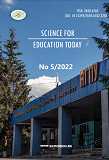Межвузовское взаимодействие как импульс для повышения качества языкового образования и развития академической мобильности
Inter-university collaboration as an impetus for improving the quality of language education and promoting academic mobility
Author(s): Irina Anatolievna Martynenko, Svetlana Sergeyevna Aleshko-OzhevskayaSubject(s): Foreign languages learning, Communication studies, Higher Education , Distance learning / e-learning, Pedagogy
Published by: Новосибирский государственный педагогический университет
Keywords: Inter-university collaboration; Inter-university seminar; Blended learning; Online learning; Foreign language teaching; Communicative skills;
Summary/Abstract: Introduction. The article focuses on theoretical and practical aspects of conducting an online inter-university seminar to improve collaboration among students. The purpose of the article is to analyse and describe the main advantages and role of blended learning and to propose ways of assisting collaboration, communication and cooperation in higher education. Materials and Methods. The study is based on the analysis of scholarly literature on foreign language teaching methods. An educational experiment was carried out and a survey was conducted. The data obtained through experiment contributed to Russian and foreign research in the area. The empirical data are analyzed and generalized. Results. The research has revealed the advantages of conducting online inter-university seminars. It is shown that inter-university collaboration enhances development of student communication skills, as well as the abilities to search, select and process information in a foreign language, improves the efficiency of group work and allows for a greater number of student participation. The student motivation is increased, language acquisition is facilitated. The authors have shown that the negative aspects include the differences in foreign language skills and in the in-depth knowledge of the subject matter. The difference in the number of participants from two universities also affects collaborative learning results. Conclusions. The article concludes that blended learning plays an important role in modern higher education allowing students to master communicative and creative skills.
Journal: Science for Education Today
- Issue Year: 12/2022
- Issue No: 5
- Page Range: 186-199
- Page Count: 14
- Language: Russian

